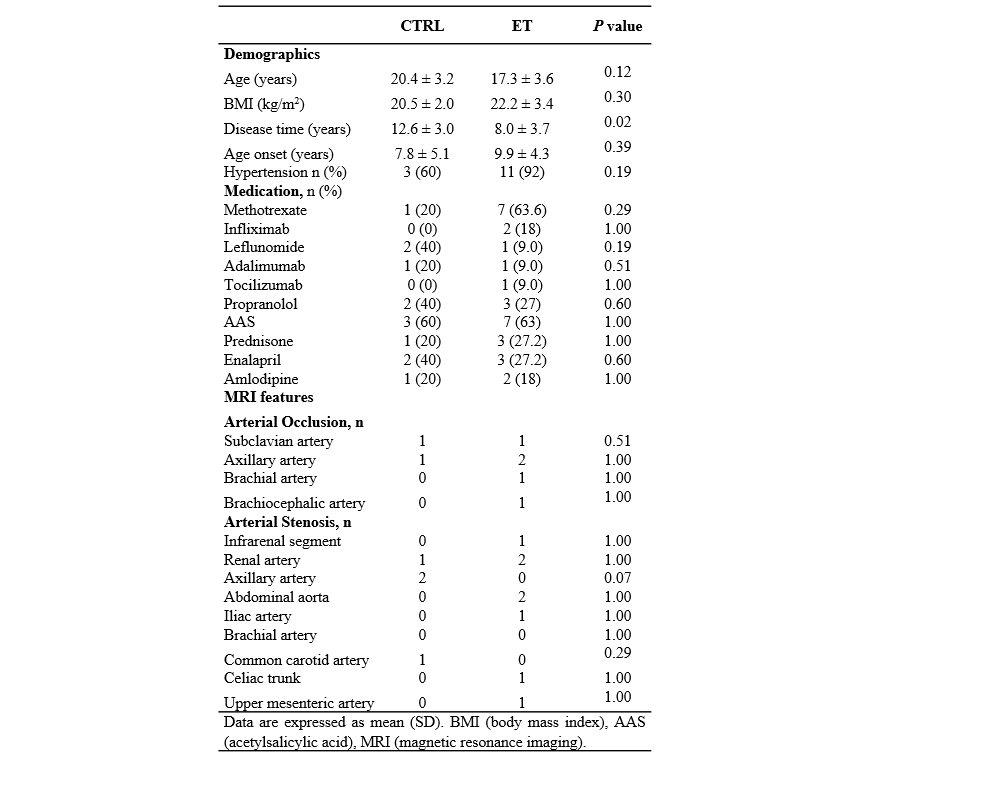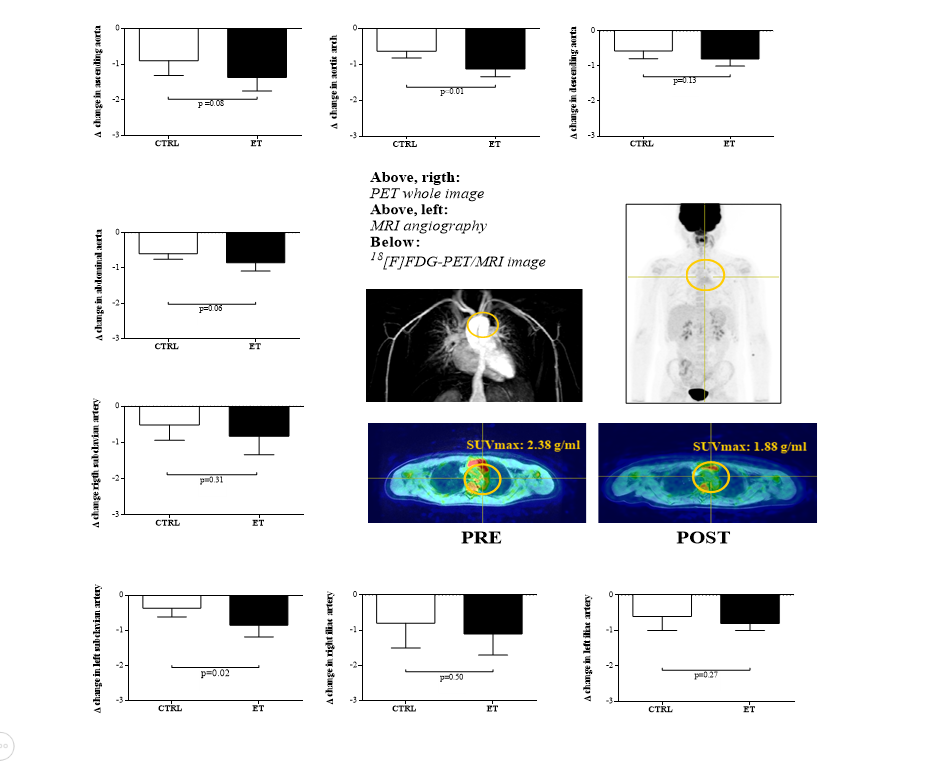Session Information
Date: Monday, November 11, 2019
Title: Pediatric Rheumatology – ePoster II: SLE, Juvenile Dermatomyositis, & Scleroderma
Session Type: Poster Session (Monday)
Session Time: 9:00AM-11:00AM
Background/Purpose: Childhood-onset Takayasu Arteritis (c-TA) is a rare primary systemic vasculitis that affects aorta and its major branches. This condition is associated with reduced wall thickness, stenosis, hypertension and high cardiovascular risk. In addition, these patients may display exacerbated inflammation and poor physical fitness. Evidence-based treatment in c-TA is limited by the absence of randomized controlled trials. Exercise training is a non-pharmacological strategy able to counteract several adverse effects related to c-TA, such as increased inflammation. We investigated the effects of an exercise-training program on arterial inflammation and pro- and anti- inflammatory cytokines in patients with c-TA.
Methods: This was a 3-center, prospective, randomized controlled trial (clinical.trials.gov: NCT03494062). Patients diagnosed with c-TA Takayasu Arteritis were randomly assigned (2:1) into the exercise training group (ET) or the non-exercised control group (CTRL). ET underwent a 12-week, 3-times-a-week, home-based exercises for the major muscle groups (squats, push-ups, sit-ups, lunges and front planks), with the support of an illustrated booklet and video, whereas CTRL received standard of care. A member of the research team (C.A.) monitored the compliance and adequacy to the exercises every two weeks. The exercise protocol comprised 3-4 sets of 8-12 repetitions maximum (RM), with a 60 to 90-second rest interval between sets and exercises. Adherence, adverse events, or signs and symptoms were self-reported. Before (PRE) and after 12 weeks of intervention (POST), the arterial inflammation (standard uptake value [SUVmax], as assessed by [18F] fluoro-deoxy-D-glucose positron emission tomography/magnetic resonance imaging [FDG-PET/MRI]), inflammatory cytokines (as assessed by CRP, ESR, IFN-γ, IL-10, IL-12p70, IL-1ra, IL-1β, IL-6 and TNF-α) and clinical scores were evaluated. A complete-case analysis was conducted using delta scores (POST – PRE) and between-group differences were tested using unpaired T-tests.
Results: Twelve patients were assigned into ET and 5 into CTRL. Three individuals from ET dropped out for personal reasons. Adherence to exercise training was 93 ± 0.06%. It was not reported any adverse events. Baseline characteristics were similar between groups (p > 0.05, table 1). Importantly, ET showed higher decreases in SUVmax values in the ascending aorta (-1.37 ± 0.38 vs -0.9 ± 0.42, p = 0.08), aortic arch (-1.13 ± 0.21 vs -0.63 ± 0.19, p < 0.01), abdominal aorta (-0.85 ± 0.23 vs -0.59 ± 0.16, p = 0.06) and, left subclavian artery (-0.85 ± 0.33 vs -0.37 ± 0.24, p = 0.02) (Figure 1) vs CTRL. Inflammatory cytokines and clinical parameters did not change between groups (all p > 0.05).
Conclusion: In this first randomized controlled trial involving c-TA patients, a 12-week, home-based exercise training program was effective in reducing arterial inflammation in this disease. These findings provide evidence that exercise could be incorporated into the treatment routine of c-TA patients in order to mitigate their cardiovascular risk.
To cite this abstract in AMA style:
Astley C, Clemente G, Terreri M, Carneiro C, lima M, Buchpiguel C, Leão Filho H, Lima F, Sá-Pinto A, Silva C, Aikawa N, Gil S, Roschel H, Pereira R, Gualano B. Exercise Improves Arterial Inflammation in Childhood-onset Takayasu Arteritis: A Randomized Controlled Trial [abstract]. Arthritis Rheumatol. 2019; 71 (suppl 10). https://acrabstracts.org/abstract/exercise-improves-arterial-inflammation-in-childhood-onset-takayasu-arteritis-a-randomized-controlled-trial/. Accessed .« Back to 2019 ACR/ARP Annual Meeting
ACR Meeting Abstracts - https://acrabstracts.org/abstract/exercise-improves-arterial-inflammation-in-childhood-onset-takayasu-arteritis-a-randomized-controlled-trial/



